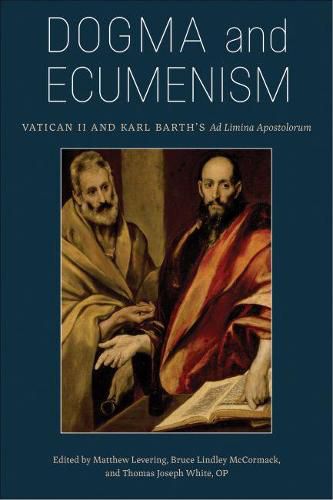Readings Newsletter
Become a Readings Member to make your shopping experience even easier.
Sign in or sign up for free!
You’re not far away from qualifying for FREE standard shipping within Australia
You’ve qualified for FREE standard shipping within Australia
The cart is loading…






The conversation of this book is structured around five major documents from the Second Vatican Council, each of which Barth commented upon in his short but penetrating response to the Council, published as Ad Limina Apostolorum. In the two opening essays, Thomas Joseph White reflects upon the contribution that this book seeks to make to contem porary ecumenism rooted in awareness of the value of dogmatic theol ogy; and Matthew Levering explores the way in which Barth’s Ad Limina Apostolorum flows from his preconciliar dialogues with Catholic repre sentatives of the nouvelle theologie and remain relevant to the issues facing Catholic theology today. The next two essays turn to Dei Verbum, the Dogmatic Constitution on Divine Revelation; here Katherine Sondereg ger (Protestant) reflects on scripture and Lewis Ayres (Catholic) reflects on tradition. The next two essays address the Dogmatic Constitution on the Church, Lumen Gentium, which touches upon central differences of Cath olic and Protestant self-understanding. Christoph Schwoebel (Protestant) analyzes visible ecclesial identity as conceived in a Protestant context, while Thomas Joseph White (Catholic) engages Barth’s Reformed crit icisms of the Catholic notion of the Church. The next two essays take up Nostra Aetate: Bruce McCormack (Protestant) asks whether it is true to say that Muslims worship the same God as Christians, and Bruce D. Marshall (Catholic) explores the implications of the Council’s reflections on the Jewish people. The next two essays take up the Pastoral Constitu tion on the Church in the Modern World, Gaudium et Spes: John Bowlin (Protestant) makes use of the thought of Aquinas to consider the prom ise and perils of the document, while Francesca Aran Murphy (Catho lic) engages critically with George Lindbeck’s analysis of the document. The next two essays explore Unitatis Redintegratio: Hans Boersma (Prot estant) asks whether the ecumenical intention of the document is im paired by its insistence that the unity of the Church is already present in the Catholic Church, and Reinhard Hutter (Catholic) systematically addresses Barth’s questions regarding the document. The noted ecumen ist and Catholic theologian Richard Schenk brings the volume to a close by reflecting on true and false ecumenism in the post-conciliar period.
$9.00 standard shipping within Australia
FREE standard shipping within Australia for orders over $100.00
Express & International shipping calculated at checkout
The conversation of this book is structured around five major documents from the Second Vatican Council, each of which Barth commented upon in his short but penetrating response to the Council, published as Ad Limina Apostolorum. In the two opening essays, Thomas Joseph White reflects upon the contribution that this book seeks to make to contem porary ecumenism rooted in awareness of the value of dogmatic theol ogy; and Matthew Levering explores the way in which Barth’s Ad Limina Apostolorum flows from his preconciliar dialogues with Catholic repre sentatives of the nouvelle theologie and remain relevant to the issues facing Catholic theology today. The next two essays turn to Dei Verbum, the Dogmatic Constitution on Divine Revelation; here Katherine Sondereg ger (Protestant) reflects on scripture and Lewis Ayres (Catholic) reflects on tradition. The next two essays address the Dogmatic Constitution on the Church, Lumen Gentium, which touches upon central differences of Cath olic and Protestant self-understanding. Christoph Schwoebel (Protestant) analyzes visible ecclesial identity as conceived in a Protestant context, while Thomas Joseph White (Catholic) engages Barth’s Reformed crit icisms of the Catholic notion of the Church. The next two essays take up Nostra Aetate: Bruce McCormack (Protestant) asks whether it is true to say that Muslims worship the same God as Christians, and Bruce D. Marshall (Catholic) explores the implications of the Council’s reflections on the Jewish people. The next two essays take up the Pastoral Constitu tion on the Church in the Modern World, Gaudium et Spes: John Bowlin (Protestant) makes use of the thought of Aquinas to consider the prom ise and perils of the document, while Francesca Aran Murphy (Catho lic) engages critically with George Lindbeck’s analysis of the document. The next two essays explore Unitatis Redintegratio: Hans Boersma (Prot estant) asks whether the ecumenical intention of the document is im paired by its insistence that the unity of the Church is already present in the Catholic Church, and Reinhard Hutter (Catholic) systematically addresses Barth’s questions regarding the document. The noted ecumen ist and Catholic theologian Richard Schenk brings the volume to a close by reflecting on true and false ecumenism in the post-conciliar period.